A $95,000 Tip Jar for Comics? 10 Thoughts on Patreon
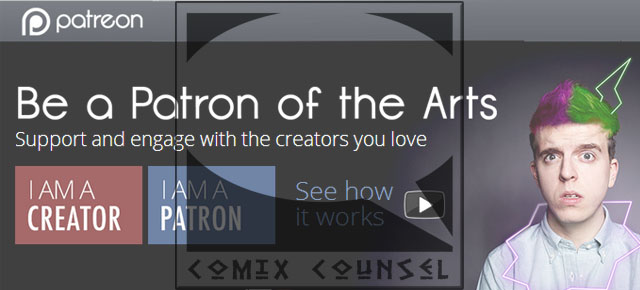
Despite Kickstarter announcing that it has crossed the $1 billion pledged mark, it is no longer the cool new kid on the crowdfunding block. Already a maturing platform, recent headlines of project implosions and high-profile Kickstarter scams have taken some of the bloom off the rose. (Of course, I’m not talking about ComixTribe’s SCAM, which was successfully funded last month thanks to you all. THANK YOU!)
Patreon, a new site that supports ongoing crowdfunding, is the hip new platform for crowdfunders. (Or should I say the “swag” new platform? I don’t think the word “hip” has been hip for decades.) Moving on…
While Patreon has been blowing up for musicians and YouTube video creators, in just the past few months, I’ve witnessed dozens of comic creators flock to the nascent crowdfunding site in search of ongoing funding for a variety of projects, including funding long-running webcomics, completely new projects, digital subscription services, comics related podcasts, and much more. As a nascent platform, the rules are still being written, and I’ll admit, I’m still trying to wrap my head around it. Here are ten thoughts on Patreon:
1. Patreon is a $95,000 Tip Jar.
Or, at least it is for Zach Weinersmith of the webcomic Saturday Morning Breakfast Cereal.
Right now, Zach’s Patreon page shows 2,932 patrons have committed to pay him $7,911.06 per month of webcomics for his work over at SMBC. Now, that’s work that he was already putting on the web for free, and would still be putting up without Patreon…this is not a no pay no comic hostage scenario. So, that makes Zach’s Patreon page worth about $95,000 annually (less Patreon and Paypal’s cut, which is about 9-10%.) While the Patreon platform does allow some perks for Patrons, (for $3/month Patrons will see SMBC comics a day early, for $10 they’ll have access to a private QA video with Zach, etc.) most Patrons are simply backing Zach for the webcomic work he is already doing.
That makes Patreon essentially a tip jar.
It’s worth pointing out that Weinersmith is the very definition of an outlier. SMBC is one of the top traffic generating webcomics on the planet, and has been for years. His site’s ad revenue is among the highest on Project Wonderful. He’s raised more than $200,000 on two Kickstarter projects in the past. Spend just a few minutes listening to Zach, like in this great Webcomics Confidential episode with Brad Guigar, and you’ll realize he’s operating on another level from most creative entrepreneurs.
Point being, Zach’s tip jar is gonna be a lot bigger than yours and mine, and pretty much everyone else in the comics industry. He’s the high point of what’s possible on Patreon for comic creators right now…but it’s a pretty impressive high point, I must admit.
2. Patreon is So New, You’re Gonna Need to Explain It.
I remember the early days of Kickstarter, when half of most Kickstarter videos were spent explaining the project, and the other half were spent explaining to backers how Kickstarter worked. Thankfully, we’ve gotten past those days, as most Kickstarter backers in 2014 have backed other projects before.
Not so with Patreon. As such, you’d do very well to follow Jason Brubaker‘s lead, and not only explain what it is you’re trying to accomplish, but how Patreon itself works.
3. Patreon is About the Person, Not the Perks.
Assholes are going to have a tough time on Patreon.
Take a look at that front page of Patreon right now. Here’s what it looked like on March 30, 2014:
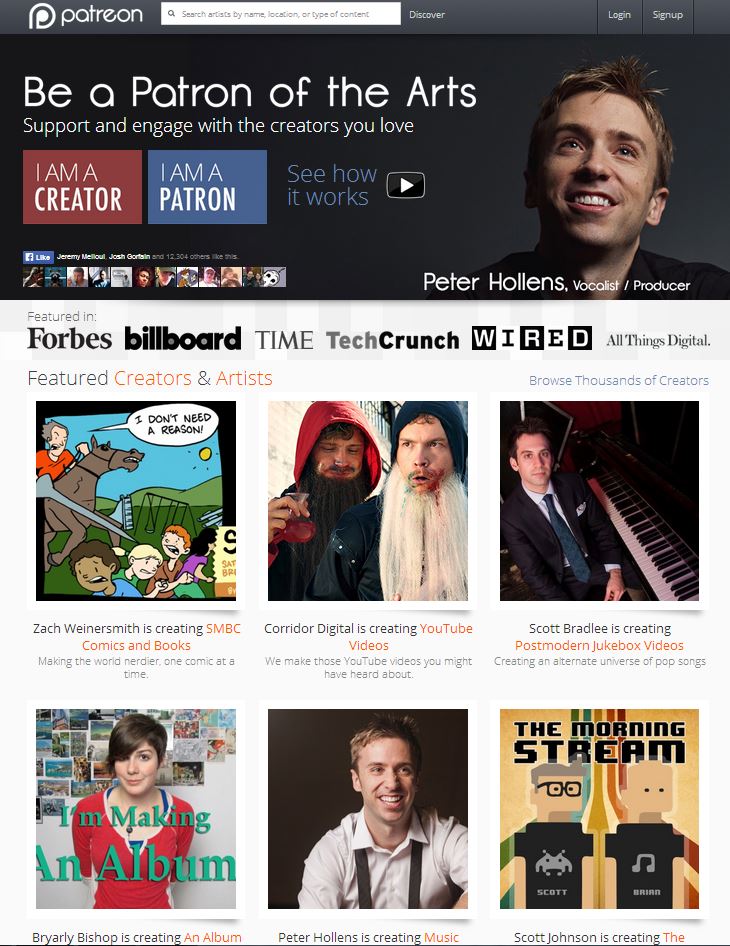
One thing that this visual shows is that Patreon is not primarily focused on selling PRODUCT…it’s selling PEOPLE.
I’ve made the point in the past that on Kickstarter or Indiegogo, passion (that of the creator and of the fan) is as important as the product. On Patreon, passion is more important than the product.
If you are a consumer and you want more stuff, or you’re a creator and you want to sell stuff…Patreon doesn’t have all that much to offer you. It’s a lousy storefront. But that’s not the point of it. As they says above, Patreon is a place to “support and engage with the creators you love.” Perks, if there are any, are just that. Lagniappe. A lil’ something extra, but not the reason you came.
That’s fundamentally different than other crowdfunding platforms.
And it also means that if nobody loves you yet, (or you’re a major asshole) you’re going to have a hard time seeing much of a return on Patreon.
4. A Patreon Creator Wants a Salary, Not a Kickstart.
This was a big takeaway from the recent Chris Oatley artcast with the Patreon founders Jack Conte and Tyler Palmer (again, essential listening for anyone interested in learning more about his new platform), who did a good job selling the key distinction between a Kickstarter project and a Patreon project.
Pay me so I can keep making stuff I want to make (ie fund my creative life), a concept that is more or less verboten on Kickstarter, seems to be perfectly okay on Patreon. Take a look at how Jon Rosenberg of Goats and Scenes From a Multiverse fame describes what he’s funding on Patreon:
My name is Jon Rosenberg. I’m the award-winning creator of the Scenes From A Multiverse and Goats webcomics. Please help me to make more comics! By becoming a patron, you’ll help offset the business and living costs of me, the cartoonist. That means more comics for you!
On Kickstarter, the phrase “offset the business and living costs” would surely set off some backers. How many times have you heard people condemn projects on Kickstarter that included things like rent or other living expenses as a part of their budgets? “I’ll give you money to help you print your book, but I’m not signing on to pay your mortgage!” sort of thinking is common.
For whatever reason, Patreon is different. The truth is, creating comics (or other stuff) is not free. It costs time (tons of it) which could almost always be spent on more lucrative (though usually less fulfilling) endeavors. There are material costs to produce creative work, and yes, if you’re trying to do this full-time, there are things like housing costs, utilities, food, medical, savings, and plenty other things to factor in.
I think it’s odd that it’s contentious to say that it’s okay for creators to get paid for that stuff. And I think Patreon has a shot at help making it okay.
5. Patreon is Probably Not a Great Platform for Starting Your Career…Yet.
Creators new and old are always going to perk up anytime there’s a new way to generate funds for their creative work. After all, that’s the dream, right?
But it’s important to recognize that the Patreon platform, as currently formulated, is not one that’s going to unlock a large new fanbase for you…just like Kickstarter circa 2010 was not a good place to discover new readers for your work.
Rather, Patreon is the latest (and perhaps smoothest) platform to get the readership/ fan base you already have, and provide them a friction-less way to support you financially.
Now, that’s not to say there’s anything stopping you, my newbie friend, from starting a Patreon page to support your new endeavor from the very start. In fact, I think some of us wait too long to try to figure out a monetization strategy for our work. But don’t expect Patreon to be a magic money tree.
6. Superstars are Needed for Patreon to Flourish.
Gannon Beck recently wrote the most thoughtful, and optimistic analysis on what the Patreon platform could be on his Space Corps webcomic blog (which is also being supported on Patreon.) Gannon writes:
Creators with fans have to lead this. Bryan [Richmond, Space Corps co-creator] and I don’t have the fan following to make a large impact, but there are a lot of creators out there that do. If creators with lots of fans make the leap of faith to attempt funding webcomics through Patreon, we fans need to support them.
7. The Question is Not “Should I Crowdfund?” But Rather “Which Crowdfunding Platform is Right for My Project?”
Another thing Beck’s post discussed is the direct market system, and how it’s broken for the vast majority of independent creators. Crowdfunding is nothing new. Every comic book on the shelf is crowdfunded, in the sense that it’s the consumer’s dollar that keeps the whole creative economy going. However, crowdfunding platforms like Patreon and Kickstarter remove the distance between creator and fan, so that dollars flow to the creator first, instead of last. This means it a creator can thrive with the support of a smaller fan base than he or she would need going through traditional channels.
Crowdfunding is here to stay, and independent and small press creators are smart to incorporate it into their business models. The right question isn’t should I crowdfund, but which platform is right for my project.
Here’s a Venn diagram looking at comics projects on Patreon vs Kickstarter, as I see it:
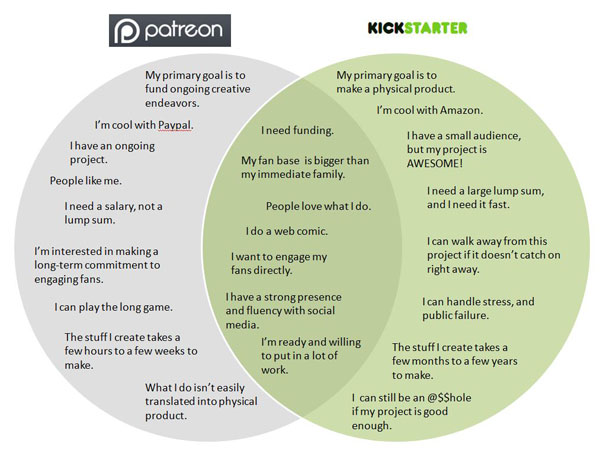
8. Improving Search and Discovery on Patreon Needs to be Top Priority…and It Sounds Like It Is.
There’s not yet a critical mass of patrons looking for creators to patronize on Patreon. But, even if there was, they’d have trouble finding projects. Hell, right now, it’s difficult to find some projects you know exist.
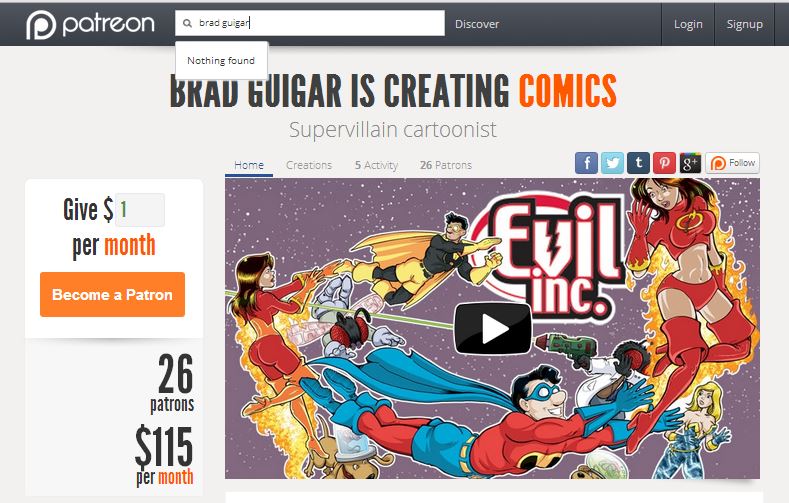
Case in point, on March 30, I typed “Brad Guigar” into the search bar on Patreon. Brad is currently involved in two Patreon projects, one for his Webcomic Evil-Inc, and one for the Patreon-Exclusive podcast “Surviving Creativity.” Yet, Patreon’s search bar returns zero results for him. Poor Brad!
I work in software. I get that a lot of things we take for granted (like smart search) are actually really complicated and hard to do well. (Thanks Google.) But competent search is crucial to Patreon’s success.
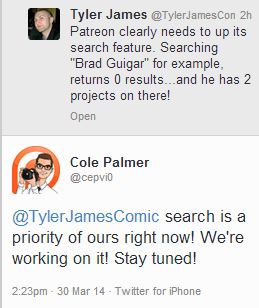
Looks like it’s a top priority, though.
9. There is More Than One Way to Fund a Comic on Patreon…But is That a Good Thing?
Clarity and focus is key to success in so many things. It’s part of the secret sauce that makes Kickstarter work — creators have a clearly stated project, with a clearly stated financial goal, progress towards which is made clearly transparent, with a clearly stated end-date, and an all-or-nothing stakes on the line. That’s one reason why Kickstarter is kicking the more “flexible” Indiegogo’s ass.
Patreon is even more flexible.
There seem to be three main comics funding models on Patreon:
1) Webcomic – Pay by the Month
Examples: Brad Guigar’s Evil Inc., Gordon Mcalpin’s Multiplex, Kelly Turnbull’s Manly Guys Doing Manly Things
This seems to be the dominant model that’s emerging for comics on Patreon, the vast majority of which are already established webcomics. Traditionally, webcomics have been supported by a combination of revenue sources, including advertising revenue, product sales, and the good old fashion donate button. A few elite webcomics have built impressive businesses this way…most have not. Patreon provides an easy way for fans of an existing webcomic to make a small dollar contribution that, collectively, can make an actual impact on creators’ bottom lines. What’s nice for creators is that Patrons only have to make the decision once and their ongoing support is automated (instead of having to remember to donate.) And it’s nice for Patrons, because they’re only charged once a month, and can budget patronage like all their other bills.
Of course, this approach really only works if you’re putting out content regularly, month in and month out.
2) Webcomic – Pay by the Page(s)
“Patreon looks to be super low maintenance and a really easy thing to integrate in with the work I’m already doing. I’m updating my comic four times a month anyway, and now people can sign up and automatically get billed without any extra effort on their part to support my work. Neat!”
“Rather than going for, let’s say $3000 per book [on a Kickstarter], I can say, “$1 per page per week and we can get this done.” Yeah, I know it’s more money for the people buying the book and I plan give more to the backers (blog posts, behind the scenes stuff, advance access), but rather than need 600 people to contribute $5 to get a book done, I just need 150 people to commit a buck a week.”
3) Digital Comic Subscription
“I wanted to test a new complete delivery service. I’ve been playing around with Gumroad, Drivethru, and have slowly been getting my stuff lined up on Comixology Submit, but felt like Patreon was an underused platform for what could essentially be a pretty good subscription service. I find the model to be pretty tidy. I’m using it primarily as a digital subscription service, though I may move to print later, but for now I’m just playing with digital. Patreon combines a fixed income, a mailing list service/blog, and a digital delivery system in one platform.”
10. Got Free? Patreon Only Works if You Do
If you’re not putting out tons of free quality content on a consistent basis, Patreon is not going to work for you.
Think marketing a Kickstarter project is hard? Try getting websites to talk about your Patreon page with 5 current Patrons on it. It’s not happening. The fact that Patreon is ongoing (and potentially) never ending, means there’s no rush to cover it or you.
It’s up to you to market your own Patreon page to your own audience, via social media, email lists, Tumblr, your blogs, etc. Maybe eventually the Patreon community will grow large enough that people will “shop” for creators to support, as happened with Kickstarter. But don’t count on it.
This means free must be a part of your Patreon strategy. Every successful Patreon project uses the power of free to distribute their content to as many people in as friction-less way as possible (free). Patreon is there to help you capture the love of your most devoted fans in the form of dollars. It’s not any more complicated than that.
I’m going to stop here. Truth is, I need to get more schooled on Patreon, and the best way to do that is to run a Patreon campaign, and support more Patreon projects. While I’m ready to do the latter, I don’t have plans to run a Patreon any time soon. Still, as a creator, the more options the better. I hope Patreon continues to remain a viable one for years to come.
Do You Have Thoughts on Patreon?
I’ve shared my analysis. What are your thoughts on this new platform?
Feel free to share your ideas in the ComixTribe forums at Digital Webbing.
Keep Reading!
If you found this article useful, you may want to read one of these three articles next:
The Pre-Order Gauntlet (or Why Kickstarter is Kicking Ass)
Everything You Need to Know About Small Press Distribution
Before You Submit to Comixology Submit
Related Posts:
Category: Comix Counsel

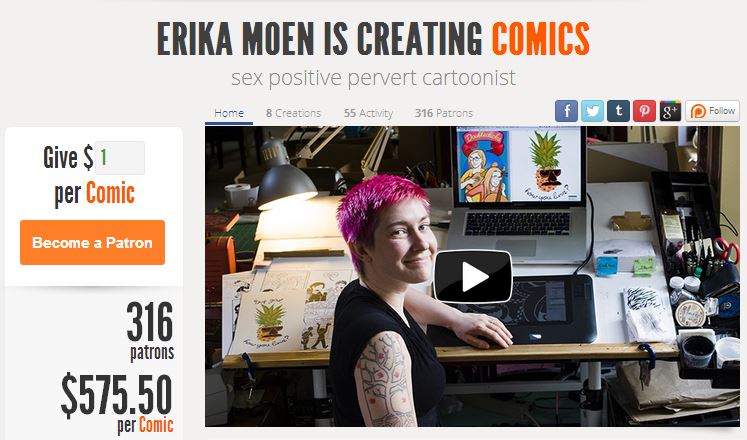
















Comments (1)
Trackback URL | Comments RSS Feed
Sites That Link to this Post